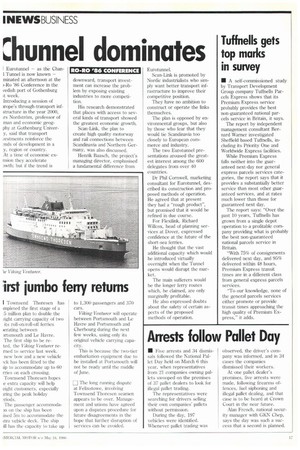:hunnel dominates
Page 17

If you've noticed an error in this article please click here to report it so we can fix it.
Eurotunnel — as the Chan1 Tunnel is now known — minated an afternoon at the i-Ro '86 Conference in the vedish port of Gothenburg it week.
Introducing a session of irope's through-transport infstructure in the year 2000, rs Nordstrom, professor of man and economic geogphy at Gothenburg enivery, said that transport vestments reinforce the ..nds of development in a y, region or country.
At a time of economic exnsion they accelerate awth; but if the trend is downward, transport investment can increase the problem by exposing existing industries to more competition.
His research demonstrated that places with access to several kinds of transport showed the greatest economic growth.
Scan-Link, the plan to create high quality motorway and rail connections between Scandinavia and Northern Germany, was also discussed.
Henrik Baasch, the project's managing director, emphasised a fundamental difference from Eurotunnel.
Scan-Link is promoted by Nordic industrialists who simply want better transport infrastructure to improve their competitive position.
They have no ambition to construct or operate the links themselves.
The plan is opposed by environmental groups, but also by those who fear that they would tie Scandinavia too closely to European commerce and industry.
The two Eurotunnel presentations aroused the greatest interest among the 600 delegates from over 40 countries.
Dr Phil Cornwell, marketing consultant for Eurotunnel, described its construction and proposed methods of operation. He agreed that at present they had a "rough product", but promised that it would be refined in due course.
For Flexilink, Richard Willcox, head of planning services at Dover, expressed confidence at the future of the short-sea ferries.
He thought that the vast additional capacity which would be introduced virtually overnight when the Tunnel opens would disrupt the market.
The main sufferers would be the longer ferry routes which, he claimed, are only marginally profitable.
He also expressed doubts about the safety of certain aspects of the proposed methods of operation.














































































